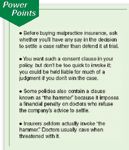Article
Malpractice: Refusing to settle could cost you
Your malpractice policy may give you that right, but you could pay a high price for invoking it.
Suppose you've been sued for malpractice, and your insurance carrier wants to settle the case rather than risk a big jury verdict. But you're convinced that your diagnosis and treatment were correct, and you're willing to take your chances with a trial. What are your options?

That's what happened to Millard Henry, an anesthesiologist in Edmond, OK. He was sued for malpractice by Jackie Parish, who claimed that Henry's negligence caused her husband to suffer a stroke during surgery for a ruptured appendix.
He probably should have agreed. The jury found him negligent, and awarded Parish total damages of $1.75 million. PLICO ended up paying only $1 million, the limit of its commitment under the policy.
The trial judge then added nearly $443,000 in prejudgment interest, which had accrued from the time Parish filed the suit several years before. PLICO appealed, arguing that Henry's policy specifically stated that the insurer "shall not be obligated to pay any claims or judgments . . . after the applicable limits of the company's liability have been exhausted by payments or judgments or settlements."
In July 2004, the Oklahoma Supreme Court reversed the trial judge's decision, holding that it would be unfair to penalize PLICO for Henry's decision to reject the settlement offers. According to the high court's ruling, making the carrier liable for prejudgment interest in an amount beyond its policy limits would effectively "force an insurance company to acquiesce" to a pretrial settlement demand-even if it had a meritorious defense-rather than risk having to pay a large amount of interest later if the plaintiff won the case.
An insurer may not be held liable for such interest in excess of the policy limits, the judges ruled, "unless the insurer has sole control over the litigation. Where, as here, the insured has the express right under the policy to disapprove any settlement offer and does so, the insurer is not liable" for any subsequent interest. Since Henry had twice refused settlement offers within his policy's limits, the judges concluded, he thereby "assumed responsibility to pay any judgment in excess of his policy's limits."
The Supreme Court's decision meant that Parish could go after Henry himself for the $443,000 in prejudgment interest. He never actually paid a dime of that sum, however, for he declared bankruptcy soon after the high court's ruling.
Another case with a penalty for refusing to settle
Clinton Aubert, an ob/gyn in Baton Rouge, faced a similar problem when he was sued by the parents of Jacob Held. They claimed that the injuries their child suffered during delivery were caused by Aubert's negligence. Several months before trial, the Helds offered to settle their claim against Aubert for $100,000. LAMMICO, his insurer, wanted to accept the offer, fearing that the child's injuries would elicit a much bigger award from a sympathetic jury. But Aubert refused, relying, like Henry, on the consent clause in his policy.





